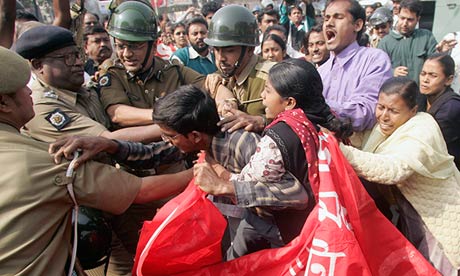 |
| Jhumpa Lahiri |
The Lowland by Jhumpa Lahiri – review
The personal and political are beautifully balanced in Jhumpa Lahiri's Man Booker-longlisted second novel
by Stephanie Merritt
The Observer, Saturday 7 September 2013
Police clash with political activists in Kolkata. Lahiri asks whether violence against the state is justified in the name of revolution. Reuters Photograph: Jayanta Shaw/Reuters
The immigrant experience is always fertile ground for fiction, and Jhumpa Lahiri – born in London to Bengali parents and raised in Rhode Island – has built her literary career exploring this territory as it relates to characters of Indian origin in America, with all the attendant questions of identity, loyalty, memory and reinvention. Though she has produced only two collections of stories and, now, two novels, her reputation is firmly established as one of the leading fiction writers of her generation. Her debut collection, The Interpreter of Maladies, won her the Pulitzer prize, a PEN/Hemingway award and the New Yorker prize for Best First Book. Her second novel, The Lowland, has already been longlisted for the 2013 Man Booker prize.
The Lowland is a sweeping, ambitious story that examines in intimate detail the intersection of the political and the personal, encompassing nearly 50 years of Indian and American history through the lives of one family. The novel ripples out from the beginnings of the Naxalite uprising in West Bengal in 1967. Two brothers, Subhash and Udayan Mitra, are attracted by the radical communist movement while at university in Calcutta. But Subhash, the more cautious and sensible of the two, quickly perceives the danger involved and withdraws, leaving to study in the US. Udayan, left behind, becomes more entrenched in militant politics, believing that violence against the state is justified in the name of revolution. It's not much of a spoiler to reveal that, early on, he is arrested and executed by the police on the lowland behind their parents' suburban house, supposedly for his part in a violent crime.
"Udayan had given his life to a movement that had been misguided, that had caused only damage, that had already been dismantled. The only thing he had altered was what their family had been." The novel pivots on this moment of Udayan's death. He leaves behind a young widow, Gauri, a fellow student already in the early stages of pregnancy. Out of a sense of duty to his brother, and to save her from a life of drudgery in Calcutta, Subhash marries Gauri and takes her back to Rhode Island. There, for the sake of propriety, they maintain the fiction that he is her daughter's father, though the lie slowly corrodes their fragile marriage.
Lahiri's writing is notable for its restraint and understatement. She resists lyricism, just as she avoids obvious drama. Until the very end of the book, every major upheaval – death, betrayal, violence – happens offstage and is recounted, second-hand. Instead, she concentrates on the minutiae of relationships – between brothers, between husband and wife, and between parents and children – and on the deep reverberations these dramatic moments create in ordinary lives. But she also – quietly, without sensationalism – draws attention to the post-independence India in which the Naxalite movement was born: the desperate poverty that led many young idealists to see revolutionary violence and self-sacrifice as the only solution. It's a chapter of history overlooked by the west, as Gauri learns when she comes to Rhode Island: "There was nothing about Calcutta. What had consumed the city, what had altered the course of her life and shattered it, was not reported here."
Lahiri structures the novel with exquisite precision, building atmosphere through cumulative detail, parsing out the backstory as Gauri and Subhash allow themselves to revisit memories from their youth, so that it is only towards the end that we learn the full truth about Udayan's death – a truth that asks us to revise our opinions of the characters and their actions.
This is especially true of Gauri, the book's most vivid character. A woman born ahead of her time, unsuited both by temperament and intellect to the conventions demanded by her culture, she reinvents herself most fully in the more liberated climate of the States, but this forging of a new self comes at a terrible cost to her family. Subhash calls her cold-hearted, but Lahiri's insight into the inner conflict of a woman who chooses her intellectual life over the demands of motherhood is unsparing and beautifully rendered.
Perhaps Lahiri spreads her net a little too wide at times; there are sudden excursions into the viewpoint of Subhash's mother or Udayan, characters who have previously existed through the eyes of others, while Bela, the daughter, feels a little indistinct, her crucial formative years somewhat glossed over until she returns as an adult. But there is no doubt that The Lowland confirms Lahiri as a writer of formidable powers and great depth of feeling, who makes the business of conjuring a story from the chaos of human lives seem quite effortless.




A great plot presented in an artistic style.
ReplyDelete"The Lowland" is a well presented work of fiction on the fate of two brothers, Subhash and Udayan, who grow up together in the suburbs of Kolkata. They make a conscious decision in their mid twenties to lead different walks of life which are diametrically opposite to each other.
The author masterfully depicts the bonding they share with each other, the result of which, they end up sharing the same girl by the name Gauri. The story proceeds further with the complications Subhash and Gauri face in leading their married life and raising a child. The thrill of what had actually happened to Udayan during his last days is maintained till the very end of the novel.
The references made on the rise of the Naxalite movement in Bengal and its impact on common man is apt.